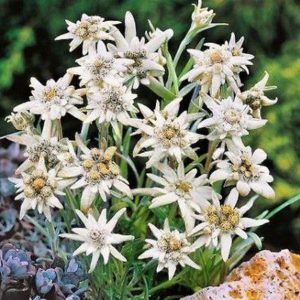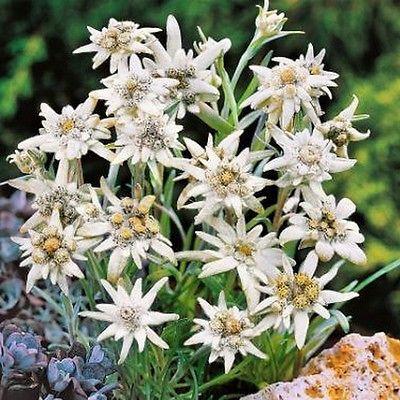
A cluster of edelweiss blooms
Edelweiss, the moving folk song from The Sound of Music, was one of Maggie’s favorites, and she once performed it for a piano recital. The piece was chosen by Charlie Hardee as a fitting final tribute to a girl known for perseverance before the focus of the program turned to worship of a God who inspired her rock-hard faith. I shared her love of the song (and movie) and found comfort and fresh insight digging a bit deeper into its history.
Edelweiss was added to The Sound of Music during rehearsals for the Broadway version which ran several years prior to the movie’s filming. Rogers and Hammerstein, the legendary composing duo, skillfully crafted a masterpiece so perfect that many fans and native Austrians believed it to be a traditional folk song from the region. This misconception is further encouraged by a scene in the movie when the entire song festival audience sings along to the enemy’s chagrin. The lyrics relate the love of homeland during tumultuous times to the scarce and short-lived flower found growing in rocky limestone elevations. The edelweiss plant was believed to impart blessing to those brave souls who endured hardship to find it and was used to treat abdominal and respiratory diseases. Hmmmm.
“Blossom of snow, may you bloom and grow” is sweetly echoed in Maggie’s life quote to bloom where you are planted. In a misguided attempt to channel her into ‘deeper waters’ of verbalizing her faith, I suggested she find a new way to express the same thought when called upon to publicly share her story. I secretly hoped she would utter profound truths from the dark mines of her anguish. But that wasn’t Maggie. Nor was that God’s plan for using her. What He did through her life is paint a picture at once familiar and unique as a flower growing in rarefied mountain air. Bloom, indeed.
That’s not the complete story of Edelweiss. Oscar Hammerstein was unaware he was suffering from stomach cancer as he pinned those immortal lyrics. It would be his last song, as he died within a year. It is hauntingly fitting that the final word he matched to music was “forever”. Maggie was inspired to begin writing her own song during a dark moment. She jotted these lines in her journal on May 9, 2015 as a beginning:
You can have this world.
You can have this life.
I will take what’s waiting
at the end of mine.
Maggie didn’t finish her song, but God finished her story with one perfect word. Forever. What will your last word be?

Thank you so much for this… My heart has forever been changed by Maggie’s journey of faith and perseverance.
You are welcome! Thank you for following her journey.
That’s one of my favorite songs . So special to me I sing it to my grandchildren when rocking them . Praying for you all ! Thanks for sharing.
I’ve used it as a lullaby, too!
As always, you’ve touched my heart with your pen!! So happy to get a hug and finally meet you in the flesh, yesterday! God bless!! My word is THROUGH. God has brought me THROUGH things I never would have thought I could and I trust he will continue to bring me THROUGH until I pass THROUGH to his side! ????
Mona, I loved meeting you and getting a hug!
Thanks for sharing. Maggie’s story is so amazing. Would love to see her journey in a book.
Thank you for the encouragement.
What a fitting tribute of Maggie’s amazing journey. All of our lives will be forever touched through Maggie. Thank you Melissa for your ENCOURAGING words. You always leave me smiling! Hugs
Machelle, I’m glad Maggie is still making people smile!
I promised I would never read these at work a LONG time ago. I should have heeded that warning I made to myself because now with tear-filled eyes I am trying to write this response. Isn’t it amazing how everything comes back around if we just dig deeper. I absolutely love the “forever”! She will Bloom and Grow FOREVER in our hearts! Also how crazy that Hammerstein died of cancer after writing such a PERFECT song. Its all so beautiful. I LOVE much more the beautiful words that Maggie wrote…”I will take what’s waiting at the end of mine”….this can only be written by a precious soul that is satisfied with her Savior and knows exactly where she will be at the end of hers. She has now made it there and I wish I could talk to her. I have lots of questions and I miss her so!!!! I LOVE you and thanks for digging deeper and sharing with all of us that don’t have your brain. LOL! Please keep doing it often.
I’ll try to remember to post after work hours! We’ll let you sing when Ken plays for us.
It’s in my playlist, and has been a favorite since we saw that movie in its first release, whatever decade that was! One day, possibly, my stroke recovery will be complete enough for me to play ‘Edelweiss’ with the same ease and feeling as during the past 50-ish years! Thanks for sharing.
Please let us know when you have it ready. We’ll share it here.
Thank you for continuing to post. To see the Lord working through you as He worked through Maggie’s short life is encouraging.
Kathy, I’m so happy to be posting again. Thank you!
One of my favorite songs and scenes from a movie. Thank you for sharing. Y’all are in our prayers.
Thank you!
This is beautifully written and a beautiful tribute to Maggie!
Thank you!
I have a feeling Maggie and I would have been fast friends had I gotten the chance to “hang out” with this sweet girl! My life long dream of meeting Julie Andrews, my love of the Sound of Music to the point of my friends throwing me a surprise “Sound of Music” 50th birthday party compete with an entire choir singing my favorites from the soundtrack (including Edelweiss), my “Bloom Where You Are Planted” wall hanging that is my prized possession that I brought to each new home I have lived in since I was a child……to name a few! Well, doesn’t everyone want to be like Maggie Hanberry!!! When I get to heaven, Maggie and I have some catching up to do!!!!
What an absolutely beautiful and fitting tribute to Maggie. I love to see how God weaves even the tiniest of details into an intricate story. Maybe Maggie’s Lee girl cousins will pick up that line she wrote and create a beautiful song from it, as they have done so often. Thank you for sharing this story!
All of the music at her service was beautiful, but this song was perfect. When it started playing, It was just different. So Maggie. Thanks for sharing the story which only makes it more perfect.
Thank you for posting Melissa. Lives are still being positively impacted by Maggie’s life journey and your inspired pen. Sick or well, may we all trust in the Lord such that we can say, as Maggie did, that “You can have this life,” while looking forward with confidence to what is waiting at the end of each of ours. Continuing to pray often for the Hanberrys.
Oh Melissa!!! What a beautiful reminder! I wore my Maggie T-shirt Wednesday and thought about the Bloom where you are planted message and the incredible message it holds! It encompasses SO much! What a perspective for us to ponder and be reminded of no matter our circumstances!!! Much love and continued prayers!!!